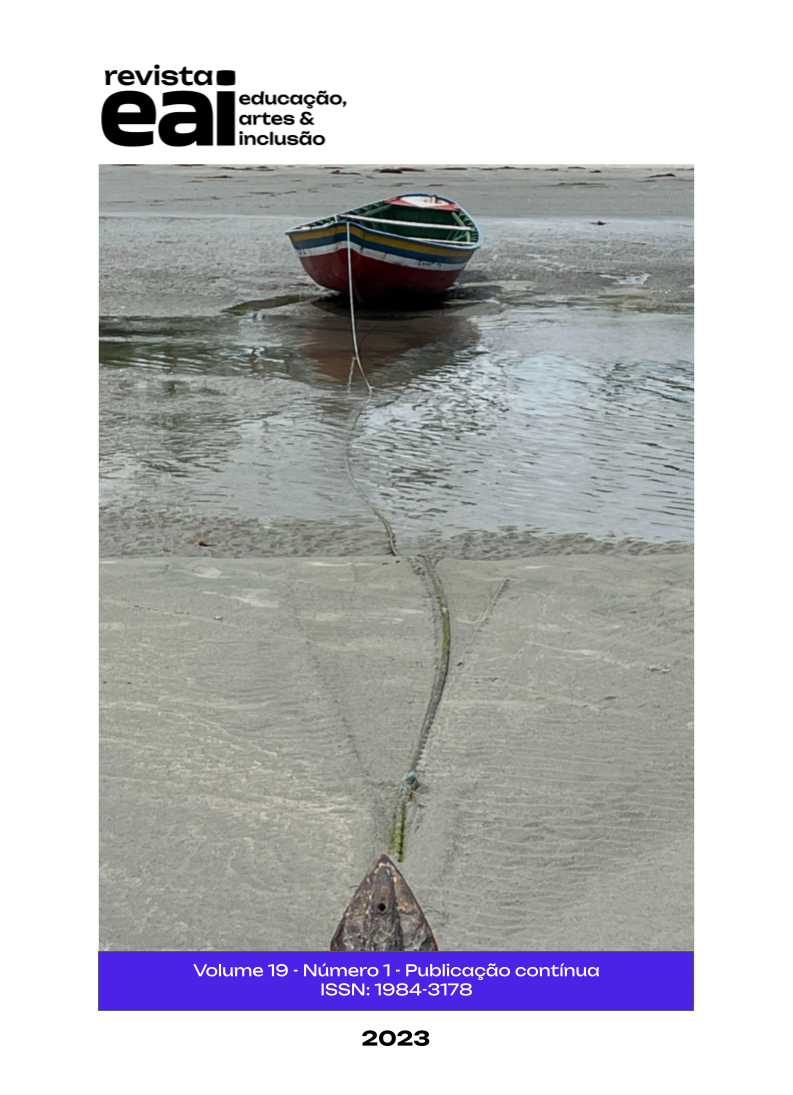Art for people with disabilities: bibliometric analysis of content of the Magazine Education, Art and Inclusion (2008-2022)
DOI:
https://doi.org/10.5965/198431781820231e0050Keywords:
inclusion, disability, arts, bibliometric researchAbstract
The article presents a bibliometric survey of the content of the Magazine Education, Arts e Inclusion, and encompasses a period that corresponds to the first edition, published in 2008, until the last edition, published in 2022, in a total of 432 published articles. 59 texts on the theme Education, Arts and Inclusion of people with disabilities and related themes are part of the analysis, that is, only 13.6% of the analyzed publications fit the theme highlighted in the title of the own magazine. The main results pointed out by the analyzes is the production of articles with an emphasis on the Visual Arts. One fact that also called our attention, corroborating with other texts on the area of knowledge, is that 75.83% of authors on this topic are women. The themes of the productions focus on the discussion of inclusion in and through Art. The objectives of the works deal with the importance of understanding its role in school inclusion, but there are also records, in smaller numbers, related to social inclusion through Art of people with disabilities.
Downloads
References
BRASIL, Lei nº 13.278, de 2 de Maio de 2016, que altera o §6º do art. 26 da Lei nº 9.394, de 20 de dezembro de 1996, que fixa as diretrizes e bases da educação nacional, referente ao ensino da arte.
GUIMARÃES, A. J. R. et al. Modelos de inovação: Análise bibliométrica da produção científica. Brazilian Journal of Information Science: Research trends, vol.15 publicação contínua, 2021, e02106. doi.org/10.36311/1981.1640.2001.v15.e02106
HAYASHI, M. C.; HAYASHI, C.R.; MARTINEZ C. M. Estudos sobre jovens e juventude: diferentes percursos refletidos na produção científica brasileira. Educação, Sociedade & Culturas, Universidade do Porto, v. 27, 2008, p. 131-154. Disponível em: https://www.fpce.up.pt/ciie/revistaesc/ESC27/27_cristina.pdf
Acesso em: 09 mar. 2023.
PIMENTA, A. A., et al. A bibliometria nas pesquisas acadêmicas. Scientia - Revista de Ensino, Pesquisa e Extensão, vol. 4, nº. 7, 2017, p. 1-13, doi.org/10.20396/rdbci.v17i0.8652810. Acesso em 25 jun. 2022.
Downloads
Published
How to Cite
Issue
Section
License
Copyright (c) 2023 Regina Finck Schambeck, Marilete Terezinha de Souza Pereira

This work is licensed under a Creative Commons Attribution-NonCommercial 4.0 International License.
Copyright Statement
The Educação, Artes e Inclusão is a journal that follows the Free Access Policy. The articles published by the journal are free of charge, intended for educational and non-commercial applications. The articles whose authors are identified represent the expression from the point of view of their authors and not the official position of the Educação, Artes e Inclusão Journal or the Educação, Artes e Inclusão Research Group.
Authors who publish in this journal agree to the following terms:
(A) Authors retain the copyright and grant the journal the right of first publication, with the work simultaneously licensed under the Creative Commons Attribution License which allows the sharing of the work with acknowledgment of authorship and initial publication in this magazine.
(B) Authors are authorized to take additional contracts separately, for non-exclusive distribution of the version of the work published in this journal (eg publish in institutional repository or as a book chapter), with acknowledgment of authorship and initial publication in this magazine.
(C) This journal provides public access to all of its content, as this allows for greater visibility and scope of published articles and reviews. For more information on this approach, visit the Public Knowledge Project.
This journal is licensed under a Creative Commons Attribution-NonCommercial-ShareAlike 4.0 International License. This license allows others to remix, adapt and create from your work for non-commercial purposes, and although new work must give you due credit and cannot be used for business purposes, users do not have to license such derivative works under the same terms.



